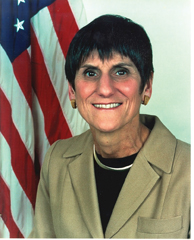
Rep. Rosa DeLauro (D-Conn.) is one of the chief sponsors of a Congressional bill that, if enacted, would require mammographers to inform patients of their breast density and choices for supplemental screening.
Looking for signs of cancer in the mammogram of a dense breast is like looking for a polar bear in a snowstorm. Because they absorb X-rays, glandular and fibrous tissue appear white, as do microcalcifications, lumps and other lesions that may indicate breast cancer.
In recent years, state legislators have sought a political solution to this diagnostic quandary, passing legislation that requires mammographers to inform women if they have dense breasts. Typically, this legislation further requires mammographers to cite the potential benefits of supplemental screening tools, such as magnetic resonance imaging (MRI) or ultrasound. Some on Capitol Hill want a similar say.
On Oct. 30, Reps. Rosa DeLauro (D-Conn.) and Steve Israel (D-N.Y.) introduced the Breast Density and Mammography Reporting Act. If this proposed House bill, H.R.3404, is enacted, it would require mammographers to include information about the patient’s breast density in their patient reports, and to explain that those with more dense breasts may benefit from supplemental screening tests.
The language of H.R.3404 emphasizes education and information: “By providing this simple piece of information, we can help women and their doctors make more informed decisions about their risks for developing breast cancer, helping improve their chances for early detection and survival,” DeLauro was quoted as saying in a press release from her office.
It would seem difficult to argue with a woman’s right to know. But information is really not what this bill is about.
Also quoted in the press release is Nancy Cappello, Ph.D., executive director and founder of Are You Dense Advocacy Inc. Capello pushed for the Connecticut state bill, the first in the nation to require breast density notification. She is the driving force behind the federal legislation spearheaded by Connecticut’s Rep. DeLauro. In the release, Cappello applauds DeLauro and Sen. Dianne Feinstein (D-Calif.), who has indicated that she will soon introduce a companion bill in the Senate, for “their relentless pursuit of equipping a woman with knowledge of her breast tissue composition so she can make an informed decision with her healthcare providers about her personal screening surveillance.”
H.R.3404 is the third attempt at such a bill in the U.S. Congress. The first, in 2010, died in committee with eight sponsors. The second, submitted the next year with 46 sponsors, suffered a similar fate. Those behind this latest attempt are fewer in number — just 21. Yet they have high hopes for its success and ultimately its beneficial effect on women’s healthcare. “Increased awareness means earlier detection, and that means more women will have a fighting chance against this terrible disease,” DeLauro said in her press release.
Why Congressional lawmakers want to get into medical practice is not clear. State legislators are already doing a pretty good job of playing doctor. Twelve states have passed legislation requiring patient notification of breast density following mammography. Pennsylvania may soon join those ranks. A federal law would standardize the requirements and reduce ambiguity, say proponents of such legislation. Opponents don’t have to look far for reasons to support their argument against this.
Congress’ attempt to shutdown ObamaCare by first shutting down the federal government instills little confidence that our legislators in Washington make good decisions when it comes to healthcare. Similarly, their acumen for writing healthcare legislation is suspect, given that Congress wrote and passed the flaw-ridden ObamaCare legislation in the first place.
We are told the path to hell is paved with good intentions. Congress seems compelled to do a gold-plated job. Maybe our representatives in D.C. should stop constructing healthcare legislation until they can prove themselves competent with the programs they have already legislated before they inadvertently do more harm than good.
Greg Freiherr has reported on developments in radiology since 1983. He runs the consulting service, The Freiherr Group. Read more of his views on his blog at www.itnonline.com.


 February 23, 2026
February 23, 2026 









